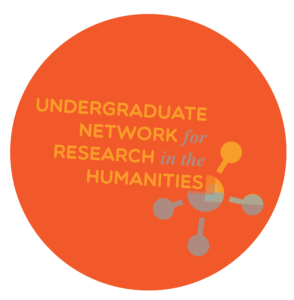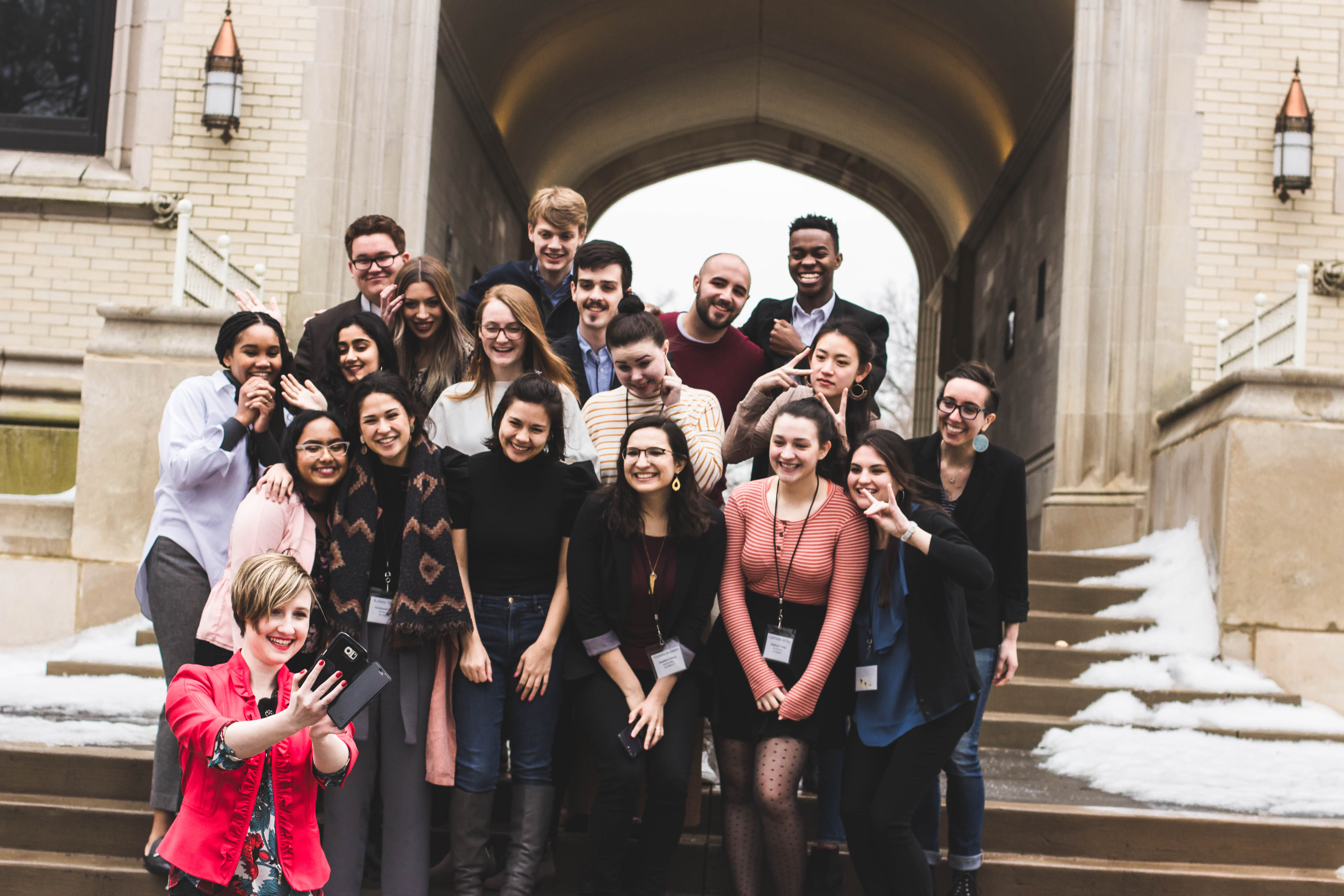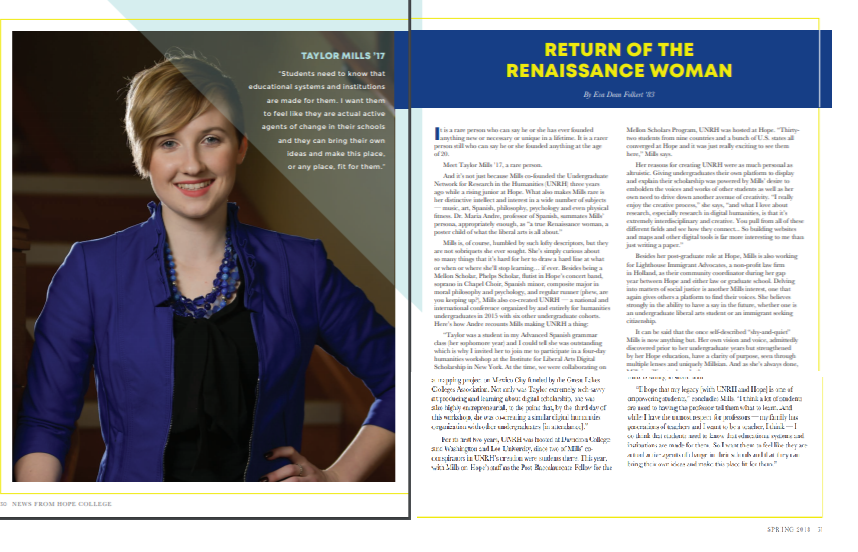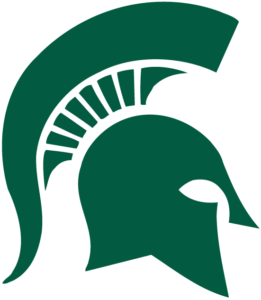Hope College’s Andrew C. Mellon Scholars Program
My story of encountering and working with Digital Humanities has been a long one, now five years long and counting. Reflecting on this journey has provided a unique lens on my own growth and development in the field. It all began with Hope College’s Andrew C. Mellon Scholars Program for Digital Liberal Arts, a two or three year-long Digital Humanities program that fostered faculty-student mentorship, digital skill-building, and student-driven independent research. This program taught me how to conduct my own research projects from start to finish and be bold when encountering new technologies. The program also sent me to numerous conferences as well as to art museums throughout Europe and India for research. It was through the Mellon program that I developed my own definition for Digital Humanities:
“Pursuing traditional humanities research questions through technologies and digital methodologies, or studying the humanistic impact of technologies in society, all with a uniquely interdisciplinary approach.”
In other words it goes both ways: the technological tools and methods can enhance the humanities, and the humanities can enhance or interrogate the influence of technologies on humanity writ large. After five years, I stand by this definition. Sure there are increasing complexities, and this definition is not all encompassing, but after another semester dedicated to furthering my education in the Digital Humanities, I think this definition not only still fits but helps convey what it is that I mean when I tell peers, colleagues, and scholars that I am invested in the Digital Humanities. Another facet I would add to the definition though because admittedly it is the reason I applied for the Mellon Program in the first place, is that the Digital Humanities allows for such creativity, especially because of its interdisciplinary nature. I enjoy writing traditional academic papers, but I love that the Digital Humanities provides opportunities to explore new mediums and presentation platforms for displaying and crafting research projects. As someone interested in too many fields, the Digital Humanities was a haven of opportunity to do projects in music, fine arts, and pedagogy.

The Undergraduate Network for Research in the Humanities
 Another step along my journey with the Digital Humanities includes the Undergraduate Network for Research in the Humanities (UNRH). In 2015 when I went to my first academic conference — ILiADS 2015 at Hamilton College with Pr. Claudine Andre to work on an art museums and institutions mapping of Mexico City project — I was blown away at how much I learned. It was here that my passion for the Digital Humanities actually came into being because my first year with the Mellon Program, the year-long introductory course, was lacking and frustrating. Seeing people collaborate, learn from each other, and explore such fascinating projects was so inspiring. Likewise, meeting peers who were also working in the field suddenly granted us undergraduates with a network of students all working through similar experiences. I learned a great deal from my peers here, and this is what led to our push for and eventual founding of an undergraduate-only Digital Humanities organization and annual conference. It was such an exciting experience to formulate a mission statement, spontaneously present on a panel, organize, and plan a conference all in two and a half months. Our first conference was a huge success, and since then it continues to be. Now as a graduate student I am looking to pass the reigns off to another undergraduate but this has proven challenging. Hopefully I am able to do so and keep UNRH afloat and undergraduate-focused. Nonethless, UNRH has taught me so much about organizing conferences, about the Digital Humanities through connecting with other scholars, technicians, students, and administrators, and about what is really possible in institutions for students. Furthermore, UNRH has brought together students from all across the globe, and I have had the honor and privilege to learn from these talented individuals from Nigeria, Pakistan, Canada, and the Ukraine. UNRH also gave me practical skills like project management, budgeting (managing an average budget of $7000-$1000), website design and maintenance, and peer review. Basically, reflecting on my experiences with the Digital Humanities requires acknowledging the huge and influential role that UNRH has played.
Another step along my journey with the Digital Humanities includes the Undergraduate Network for Research in the Humanities (UNRH). In 2015 when I went to my first academic conference — ILiADS 2015 at Hamilton College with Pr. Claudine Andre to work on an art museums and institutions mapping of Mexico City project — I was blown away at how much I learned. It was here that my passion for the Digital Humanities actually came into being because my first year with the Mellon Program, the year-long introductory course, was lacking and frustrating. Seeing people collaborate, learn from each other, and explore such fascinating projects was so inspiring. Likewise, meeting peers who were also working in the field suddenly granted us undergraduates with a network of students all working through similar experiences. I learned a great deal from my peers here, and this is what led to our push for and eventual founding of an undergraduate-only Digital Humanities organization and annual conference. It was such an exciting experience to formulate a mission statement, spontaneously present on a panel, organize, and plan a conference all in two and a half months. Our first conference was a huge success, and since then it continues to be. Now as a graduate student I am looking to pass the reigns off to another undergraduate but this has proven challenging. Hopefully I am able to do so and keep UNRH afloat and undergraduate-focused. Nonethless, UNRH has taught me so much about organizing conferences, about the Digital Humanities through connecting with other scholars, technicians, students, and administrators, and about what is really possible in institutions for students. Furthermore, UNRH has brought together students from all across the globe, and I have had the honor and privilege to learn from these talented individuals from Nigeria, Pakistan, Canada, and the Ukraine. UNRH also gave me practical skills like project management, budgeting (managing an average budget of $7000-$1000), website design and maintenance, and peer review. Basically, reflecting on my experiences with the Digital Humanities requires acknowledging the huge and influential role that UNRH has played.

Mellon Post-Baccalaureate Digital Fellow
I owe the Digital Humanities all of the aforementioned experiences, most notably of independent research opportunities, traveling, scholarly relationships and personal friendships for a lifetime, and, after graduating in 2017, my first academic job as a non-student! For the 2017-2018 school year I served as the Mellon’s Post-Baccalaureate Digital Fellow through which I co-planned and hosted the 2018 UNRH InterHumanities Conference, as well as redesigned and co-taught the same year-long introductory course I took back in 2014-2015. This course struggled because it was co-taught between a tenured humanities professor and a techy young graduate student, but the power dynamics were odd and the attempt to make an interdisciplinary class by bringing together the two fields, but the result was two disjointed courses rather than a truly interdisciplinary experience. It was a noble attempt but felt lacking. My design for the course was to emphasize the research project design process from start to finish and to trace the development of the Digital Humanities through traditional approaches to humanities research. The units were as follows: Early Stages and the Archives, Midway and Public Scholarship, CCP-Collaboration, Communication, and Presentation, and Advanced Tools and Topics. Based on the student evaluations in which students reflected on how much comfort, knowledge, and skills they had before versus after taking the course, I would say it went well! I personally learned how to design a course syllabus, prepare effective tutorials, and help mentor undergraduates through projects and the program. I loved this job working with students and this position inspired me to seek jobs in the future that are dual appointments in humanities (philosophy for me) and the Digital Humanities. I felt so honored to have been featured in Hope’s Magazine that celebrated the successes of the program and of UNRH.

MSU Digital Humanities Certificate Program-DH865
 All of the previous experiences have led me to where I am now, a graduate student pursing a PhD in Philosophy and the Certificate in Digital Humanities. I am constantly looking for ways to integrate the two fields and in fact, after this course, I am inspired to complete a summer project, funded by the College of Arts and Letters to write an article that debunks the myths philosophers generate and believe about using the Digital Humanities in their classrooms. I am excited about this project. Another valuable part of this course was meeting other students from different departments. Once part of a graduate program you seldom get to meet students outside of the department. Like I said earlier, this is one of the beauties of the Digital Humanities: its interdisciplinary and pulls people from a multitude of departments. I learned a great deal from my peers, and formed friendships with some of the students in this course. I especially loved hearing from Ablie and his decolonial work and Ja’La’s projects in Digital Media and Rhetoric. The podcasting assignment was probably my favorite specifically because I had an opportunity to learn more about Ja’La’s work. Since I have had a vast amount of exposure to the Digital Humanities before coming to MSU I admittedly did not encounter any new tools or technologies in this course, but I enjoyed discussing their different uses and applications for students working in fields different from my own. Of all the readings, this was new and my favorite: Catherine D’Ignazio, and Lauren Klein’s Data Feminism.
All of the previous experiences have led me to where I am now, a graduate student pursing a PhD in Philosophy and the Certificate in Digital Humanities. I am constantly looking for ways to integrate the two fields and in fact, after this course, I am inspired to complete a summer project, funded by the College of Arts and Letters to write an article that debunks the myths philosophers generate and believe about using the Digital Humanities in their classrooms. I am excited about this project. Another valuable part of this course was meeting other students from different departments. Once part of a graduate program you seldom get to meet students outside of the department. Like I said earlier, this is one of the beauties of the Digital Humanities: its interdisciplinary and pulls people from a multitude of departments. I learned a great deal from my peers, and formed friendships with some of the students in this course. I especially loved hearing from Ablie and his decolonial work and Ja’La’s projects in Digital Media and Rhetoric. The podcasting assignment was probably my favorite specifically because I had an opportunity to learn more about Ja’La’s work. Since I have had a vast amount of exposure to the Digital Humanities before coming to MSU I admittedly did not encounter any new tools or technologies in this course, but I enjoyed discussing their different uses and applications for students working in fields different from my own. Of all the readings, this was new and my favorite: Catherine D’Ignazio, and Lauren Klein’s Data Feminism.
All in all my experiences with the Digital Humanities have been exceedingly rewarding and I do not plan to stop working in this space any time soon. I look forward to further engagement with the certificate program, and hopefully, a dual teaching appointment after graduating.
[for more direct feedback on the course specifically I refer to the SIRs]